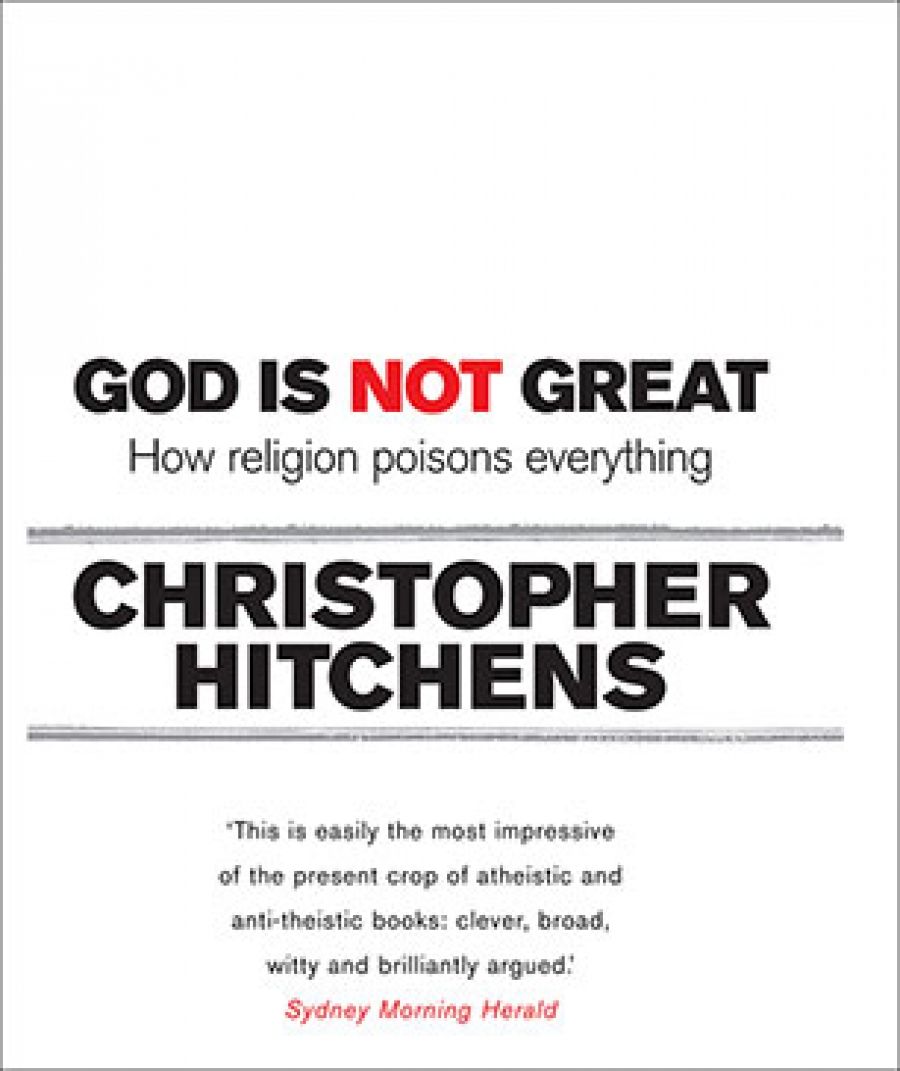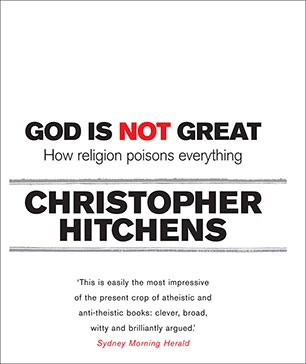
- Free Article: No
- Contents Category: Philosophy
- Review Article: Yes
- Online Only: No
- Custom Highlight Text:
The only salutary effect, it seems to me, of the evolution of religious fundamentalism over recent decades is the current reaction of some scientists, philosophers and public intellectuals. Since the end or the Enlightenment, interest in reasoned polemic against religion (which excludes communist attempts to extirpate it) has largely waned, possibly on the false supposition that the quarry had been mortally wounded. But the emergence of ruthless Islamist ambitions and terrorism, and the malign influence of elements of the Christian right and of right-wing Jewish groups, especially in George W. Bush’s America, appear at last to have spurred intellectuals to produce books and documentaries, to confer and to organise, to engage in resistance to what is rightly perceived as a religious assault on reason and liberal values, as the dying of secular light. The most prominent of the current critics are the philosophers Daniel Dennett and Michel Onfray, the biologist Richard Dawkins and the versatile Christopher Hitchens.
- Book 1 Title: God is Not Great
- Book 1 Subtitle: How religion poisons everything
- Book 1 Biblio: Allen & Unwin, $29.95 pb, 307 pp
- Book 1 Cover Small (400 x 600):

- Book 1 Cover (800 x 1200):

Of the caustic half-dozen literary assaults on religion landing recently on Australian shelves, God Is Not Great is the most inviting and accessible. It is hardly ‘the ultimate case against organised religion’ advertised on its back cover, but it does present a wide-ranging, doughty and occasionally entertaining critique. Hitchens is an educated journalist and writes easy, informative prose. But he is also a pugilist and creates in this book the unfortunate impression of having incorrigible opinions on most things under the sun, and beyond. His excesses are only partially extenuated by his wide experience, and by his unquestionable passion and courage. He was in Beirut during the civil war prosecuted by religious militias, and in Sarajevo when it was shelled: he witnessed religious violence in Ireland, India and Palestine, the horrific depredations of the Lord’s Resistance Army in Uganda and the church-assisted genocide in Rwanda; he attended the Bhagwan, talked with religious hucksters, observed the manufacture of Mother Teresa’s ‘miracles’, and interviewed the unspeakable Rabbi Meir Kahane; he visited North Korea, whose political organisation he describes as a debased form of Confucianism and ancestor worship. These firsthand experiences, knitted into his critical purpose, endow Hitchen’s book with distinctive interest.
Hitchen’s design is in three main parts. He sweeps through the history of religious iniquity; exposes the foundational texts as vitiated, crude, man-made concoctions; and rebuts the metaphysical arguments for the existence of deity. He thinks that the latter arguments are puerile, and points out that most children today know far more about the natural order of the cosmos than did the authors of these old arguments – which is true, but not altogether relevant since the arguments are largely a priori. Apart from the (intelligent) design argument, Hitchens’ discussion is perfunctory. For example, the so-called ‘ontological argument’ – one version of which is that from the (putative) fact that we have an idea of a perfect necessary being it follows that such a being exists – is dismissed as ‘traditional tripe’. These arguments are almost certainly unsound, but they have exercised surer philosophers than Hitchens for centuries.
He is much better on the moral case against religion, where his own observations and impressive historical knowledge of religious turpitude is effectively applied. The book’s subtitle, ‘How Religion Poisons Everything’, is uncompromising and, unsurprisingly, its conclusions are harsh. Religion is ‘violent, irrational, intolerant, allied to racism and tribalism and bigotry, invested in ignorance and hostile to free inquiry, contemptuous of women and coercive toward children’. It is the enemy of science and inquiry, and has ‘subsisted largely on lies and fears ... the accomplice of ignorance and guilt as well as of slavery, genocide, racism and tyranny’. Laying out the evidence for these indictments fills most of the book’s pages.
There is no dearth of evidence, and Hitchens is industrious. Much of it will be familiar to readers with an interest in these things, but some material may be new and thus controversial. The credible account of Catholic Church complicity, at least at low levels, with the Rwandan genocide, and with fascism and Nazism, at the highest levels, are particularly disturbing. The extent of the intimacy between the Church and the Nazi régime and its sympathisers was, to me, a discovery; perhaps symbolic of it is the (alleged) fact that although many Nazis retained strong Catholic affiliations, the Church had only ever excommunicated one of them, Goebbels – for marrying a Protestant. But Hitchens is not frugal with his reprehensions, and Protestant fundamentalists, Mormons, Sri Lankan Buddhists, Japanese Buddhists in the years leading up to World War II, male circumcisers, female mutilators, religious charlatans and many others operating under the cloak of religious inspiration also get a thorough drubbing.
However, embarrassing religion with its history, bad eggs and associations can yield only limited controversial results. Hitchen’s thrashing about is directed at showing that religion is intrinsically evil, but the most his mode of argument can show is that it is contingently so. Religious apologists would quickly concede the bad eggs and tragic lapses, but urge that these are aberrations, misuses of religion, religion used as pretext, and so on. And the apologists would have a point. Hitchens is not careful to distinguish the circumstances when religion functions as an efficient cause or sanction of iniquity, and when it is merely an innocent bystander recruited as a pretext: when, for example, territorial ambitions or psychopathic murderousness are concealed under religious garb. His inductive argument accumulates inculpating associations between religion and its alleged vicious consequences, but does not show what it is about religion that necessarily generates these consequences.
Hitchens does not see this clearly because he has a simple, but false and misleading, understanding of the nature of religion – one he shares with most of the other critics. On the whole, they believe that people’s religious attitudes and beliefs are direct products of religious educations based on crude and often barbaric foundational texts: for example, monotheistic fundamentalists subjugate women and abominate homosexuals because they have imbibed sections of the Bible or the Koran which state that women are inferior and that homosexuals are to be abominated. Exodus states that ‘Thou shall not suffer a witch to live’, and this was ‘the warrant for the Christian torture and burning of women who did not conform’. And so on. The evil and efficacy of religion, on this account, are basically reflections of the evil and efficacy of the foundational texts and commentaries.
This understanding explains why these authors expend so much energy exposing the inconsistencies, vitiations, absurdities and moral horrors of the foundational texts. But it only dimly occurs to Hitchens to ask why so many people, even today, readily embrace the crude and savage stuff. Hitchens offers commonplaces. He notes a ‘religious impulse – the need to worship’, human credulousness and, rather casually, fear: there would be no churches ‘if humanity had not been afraid of the weather the dark, the plague, the eclipse, and all manner of other things now easily explicable’. And as for consolation ‘since religious people so often insist that faith answers this supposed need, I shall simply say that those who offer false consolation are false friends’.
All this may be true, but its omissions and tenor reveal the peculiar detachment and superficiality of Hitchen’s thought. Entirely absent in his book is any serious sense of connection between religion and fundamental motives to it – suffering, the terror of abandonment, the loss of self-respect and hope for an unblighted life. The multiplicity and significance of the needs that religions assuage or satisfy simply pass him by. O the mind, mind has mountains. So when he paints his alternative secular vision Hitchens merely appears silly. ‘The loss of faith can be compensated by the newer and finer wonders that we have before us, as well as immersion in the near-miraculous work of Homer and Shakespeare and Milton …’ Atheists, he says, have no need to proclaim their rectitude, fight over holy ground, or grovel and wallow in their unworthiness: ‘we can counterpose a leisurely or urgent walk from one side of the library or the gallery to another, or to lunch with an agreeable friend in pursuit of truth or beauty.’ But what if the wretched of the earth have no libraries?


Comments powered by CComment